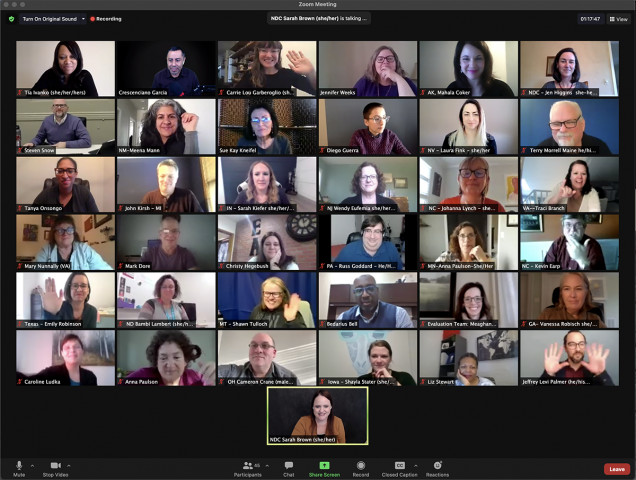The transition from high school to further education, training, or career is a pivotal time for young people. Marginalized groups – including deaf students – are especially vulnerable during this time, and access to services is critical to ensuring success.
State leaders in deaf education, vocational rehabilitation, and other areas vital for #DeafSuccess met online on Jan. 12 as part of the National Deaf Center on Postsecondary Outcomes’ Engage for Change | state initiative.
“Engage for Change is all about bringing people together and making connections,” said NDC director Carrie Lou Garberoglio, PhD. “This meeting allowed state leaders to share their challenges and strategies for success, helping to improve outcomes for deaf youth across the country.”
A total of 43 leaders from 31 states shared ways to increase access to services for deaf youth particularly those from marginalized communities, using NDC’s data-driven approach that has yielded success for many states.
Reducing Barriers with New Ways to Reach Out
Many of the state leaders said their biggest challenge is finding and reaching out to deaf youth – especially those who live in rural areas. But, many shared their success stories as well.
One way states have overcome this particular challenge is by breaking down silos and collaborating with other state agencies. This allows leaders to share data on students that have been identified by other agencies and reach out with information about what services were available and how the students could access those resources.
The COVID-19 pandemic also opened doors for using technology to reach more students than before, especially in rural areas where it can be particularly difficult to connect with students in-person. As more students gain access to high-speed internet and other technology at home, virtual services are becoming increasingly popular.
New Relationships Can Build Understanding
Many students, parents, teachers, and administrators may not understand the full range of vocational rehabilitation services available, who qualifies, or how to access services.
Some states have tackled this problem by hiring additional vocational rehabilitation counselors to build relationships with high school students before they graduate. These counselors can work with school districts and individual students to help students understand and access VR services, answer questions, and provide assistance when needed.
VR counselors are also getting additional training to help them understand and connect with diverse populations. With this training, counselors can better identify and reach out to underrepresented deaf students.
Data-Driven Decisions
NDC facilitated the discussion by sharing an overview of several data reports compiled by NDC based on information from national databases, resources, and experience.
Jeffrey Palmer, PhD, led a presentation that spotlighted key findings from Deaf People and Vocational Rehabilitation: Who Is Being Served?, a new report from NDC. The report highlighted gaps in who is being served by VR — including fewer Black, young, female, and disabled deaf people than national averages. Deaf people are also more likely to be put on waiting lists, according to the report.
State leaders used this information to feed conversations about how to improve their offerings for deaf people. Attendees also shared their own tips for collecting, analyzing, using data to improve access to services.
More Information
For more information, read the following data reports:
American Community Survey Data
-
Deaf People and Educational Attainment in the United States.
-
Postsecondary Achievement of Black Deaf People in the United States.
National Postsecondary Student Aid Study Data
Rehabilitation Services Administration Data
Or reach out to NDC’s help team with questions, concerns, and more. NDC also has hundreds of free resources and free online courses available for agencies, institutions, schools, and deaf students and their families.









